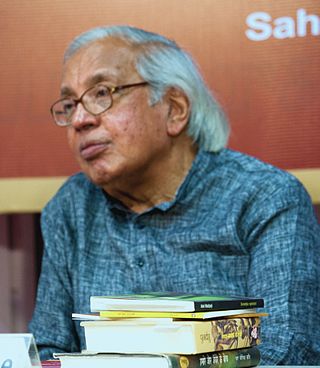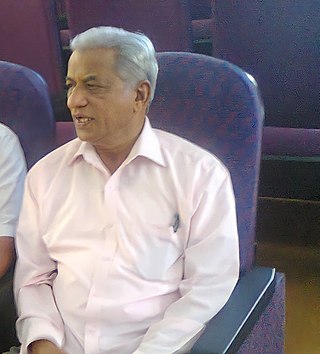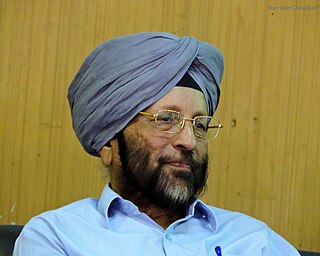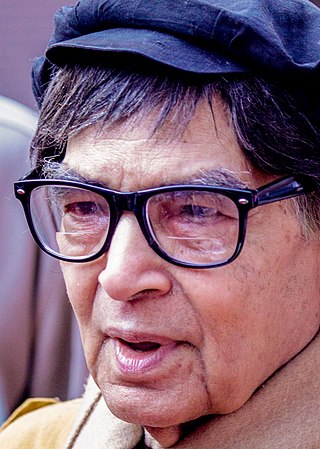
Nayantara Sahgal is an Indian writer who writes in English. She is a member of the Nehru–Gandhi family, the second of the three daughters born to Jawaharlal Nehru's sister, Vijaya Lakshmi Pandit.

Jayanta Mahapatra was an Indian poet. He is the first Indian poet to win a Sahitya Akademi award for English poetry. He was the author of poems such as "Indian Summer" and "Hunger", which are regarded as classics in modern Indian English literature. He was awarded a Padma Shri, the fourth highest civilian honour in India in 2009, but he returned the award in 2015 to protest against rising intolerance in India.

Shashi Deshpande is an Indian novelist. She is a recipient of the Sahitya Akademi Award and the Padma Shri Award in 1990 and 2009 respectively.

The Sahitya Akademi Award is a literary honour in India, which the Sahitya Akademi, India's National Academy of Letters, annually confers on writers of the most outstanding books of literary merit published in any of the 22 languages of the 8th Schedule to the Indian constitution as well as in English and Rajasthani language.

Malleshappa Madivalappa Kalburgi was an Indian scholar of Vachana sahitya in the Kannada-language and academic who served as the vice-chancellor of Kannada University in Hampi. A noted epigraphist of Kannada, he was awarded the National Sahitya Akademi Award in 2006 for Marga 4, a collection of his research articles.
The Pampa Award is a literary award in the Indian state of Karnataka. The award was established in 1987 by the government of Karnataka. It is the highest literary honor conferred by the Department of Kannada and Culture, Government of Karnataka State, and recognises works written in the Kannada language.

Uday Prakash is a Hindi poet, scholar, journalist, translator and short story writer from India. He has worked as administrator, editor, researcher, and TV director. He writes for major dailies and periodicals as a freelancer. He has also received several awards for his collection of short stories and poems. With Mohan Das he received Sahitya Academi Awards in 2011. He is the first author to return his Sahitya Akademi award on September 3, 2015 against the killing of M. M. Kalburgi that initiated a storm of national protests by writers, artists,scholars and intellectuals.

Ashok Vajpeyi is an Indian Hindi-language poet, essayist, literary-cultural critic, apart from being a noted cultural and arts administrator, and a former civil servant. He was chairman, Lalit Kala Akademi India's National Academy of Arts, Ministry of Culture, Govt of India, 2008–2011. He has published over 23 books of poetry, criticism and art, and was awarded the Sahitya Akademi Award given by Sahitya Akademi, India's National Academy of Letters, in 1994 for his poetry collection, Kahin Nahin Wahin. His notable poetry collections include, Shaher Ab Bhi Sambhavana Hai (1966), Tatpurush (1986), Bahuri Akela (1992), Ibarat Se Giri Matrayen, Ummeed ka Doosra Naam (2004) and Vivaksha (2006), besides this he has also published works on literary and art criticism: Filhal, Kuchh Poorvagrah, Samay se Bahar, Kavita ka Galp and Sidhiyan Shuru ho Gayi Hain. He is generally seen as part of the old Delhi-centric literary-cultural establishment consisting of bureaucrat-poets and academicians like Sitakanta Mahapatra, Keki Daruwalla, J.P.Das, Gopi Chand Narang, Indra Nath Choudhari and K.Satchidanandan.

Damodar Mauzo is an Indian short story writer, novelist, critic and script writer in Konkani. He was awarded the 57th Jnanpith Award, India's highest literary honour, in 2022, Sahitya Akademi Award in 1983 for his novel Karmelin and the Vimala V. Pai Vishwa Konkani Sahitya Puraskar award for his novel Tsunami Simon in 2011. His collection of Short stories Teresa's Man and Other Stories from Goa was nominated for the Frank O'Connor International award in 2015. He has served as a member of the executive board, general council, as well as the finance committee of the Sahitya Akademi.

Kallahalli Sannegowda Bhagawan, known as Prof. K. S. Bhagawan, is an Indian Kannada writer, rationalist, translator, critic, scholar and retired professor. In addition to his works on Hinduism, Indian culture and history, he has translated the works of William Shakespeare including Julius Caesar and Hamlet. He is a recipient of many awards including the Rajyotsava Award, Kuvempu Award and the Lokayata Award.
Rahman Abbas is an Indian fiction writer and the recipient of the India's highest literary Award Sahitya Akademi Award for his fourth novel Rohzin in 2018. He is also the recipient of the two State Academy Awards for his third and fourth novels respectively i.e. Hide and Seek in the Shadow of God (2011) and the Rohzin in 2017. He is the only Indian novelist whose work in German has received a LitProm Grant funded by the German Federal Foreign Office and the Swiss-South Cultural Fund. He writes in Urdu and in English. His novels deal with themes of forbidden politics and love.

Gurbachan Singh Bhullar is a Punjabi author of short stories. In 2005, he was awarded the Sahitya Akademi Award for his short story collection Agni-Kalas.

Chandrashekar Patil, popularly known as Champa, was an Indian poet, playwright and public intellectual writing in Kannada. Patil was a recipient of the Karnataka Sahitya Akademi Award for Poetry in 1989 and the Karnataka state government's Pampa Award in 2009. Patil had served as the president of the Kannada Sahitya Parishat, a Kannada language literary organization.

Anil Joshi is a Gujarati language poet and essayist from Gujarat, India. He won Sahitya Akademi Award for Gujarati in 1990 for his essay collection Statue (1988). His significant works include Kadach, Barafna Pankhi and Pavan Ni Vyaspithe.

Mandakranta Sen is an Indian poet of Bengali language. She became the youngest ever winner of Ananda Puraskar in 1999 for her very first poetry book. In 2004, she was awarded Sahitya Akademi Golden Jubilee Award for poetry. She is also a lyricist, composer, fiction writer, dramatist and cover designer. She quit medical studies to become a full-time writer.

Kailash Vajpeyi was an Indian poet, writer, and lyricist who chiefly wrote Hindi language poems throughout his literary career. He wrote more than 28 books, including one of his publications Hawa Mein Hastakshar which translates to "signature in the air" for which he was awarded a literary honour Sahitya Akademi Award in 2009. The University of Lucknow awarded him Vachaspati title in recognition of his contribution to Hindi literature.
The 2015 Dadri lynching refers to case of lynching in which a mob of villagers attacked the home of 52 year-old Mohammed Akhlaq, killing him, for suspicion of slaughtering a cow. The attack took place at night, on 28 September 2015 in Bisahda village, near Dadri in Uttar Pradesh, India. The mob consisting of local villagers, attacked Akhlaq's house with sticks, bricks and knives, saying that they suspected of him stealing and slaughtering a cow calf.
"Shav Vahini Ganga" or "Shab-Vahini Ganga" is a 2021 Gujarati-language poem that was written by Indian poet Parul Khakhar. The poem criticises the Indian government's handling of the COVID-19 pandemic. Her verses attracted widespread attention, particularly on social media, after she posted the poem on Facebook. The poem has been translated into several languages.
Ketavarapu Katyayani, best known by her pen name Katyayani Vidmahe, is an Indian writer and academic. Her work focuses on Telugu literature, particularly feminist and Marxist writing.













